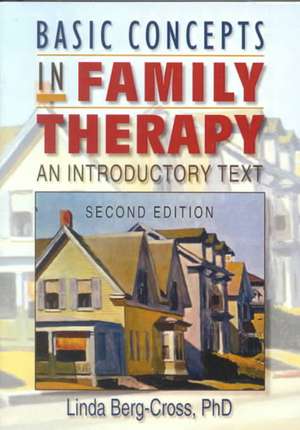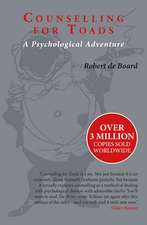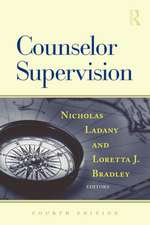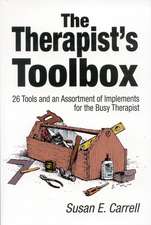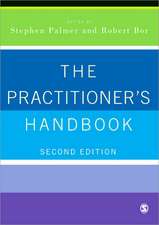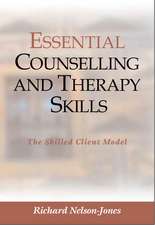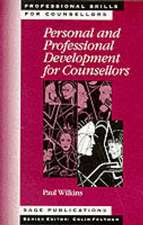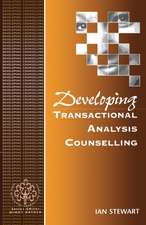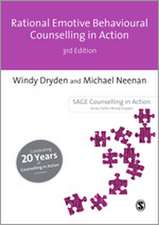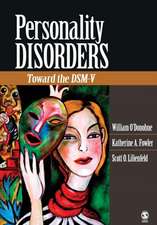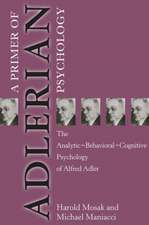Basic Concepts in Family Therapy: An Introductory Text, Second Edition
Autor Linda Berg Crossen Limba Engleză Paperback – 14 feb 2000
Basic Concepts in Family Therapy: An Introductory Text, Second Edition, presents twenty-two basic psychological concepts that therapists may use to understand clients and provide successful services to them. Each chapter focuses on a single concept using material from family therapy literature, basic psychological and clinical research studies, and cross-cultural research studies. Basic Concepts in Family Therapy is particularly useful to therapists working in a family context with child- or adolescent-referred problems, and for students and clinicians treating the problems they see every day in their community.
The book builds on the strengths of the first edition, incorporating ideas and articles that have become worthy of investigating since 1990 into the original text. This new edition also introduces five new chapters on resiliency and poverty, adoption, chronic illness, spirituality and religion, and parenting strategies. The new chapters make the book far more relevant for students and clinicians try ing to use family theory and technique in response to the problems they see in their communities.
Basic Concepts in Family Therapy will assist you in offering clients better services by providing a deeper understanding of the contemporary family in its various forms, the psychological bonds that shape all families, and the developmental stages of the family life cycle. This exploration of how family demography, stages and life cycles affect family functions is a solid foundation from which all of the therapeutic concepts in this book can be explored.
Some of the facets of family therapy you will explore in Basic Concepts in Family Therapy are:
- the importance of spirituality and religion in family therapy
- generational boundaries, closeness, and role behaviors
- managing a family's emotions
- defining problems and generating and evaluating possible solutions
- teaching children specific attitudes, values, social skills, and norms
- transracial adoptions and normative processes and developmental issues of adoptive parents
- strategies for reducing conflict
- . . . and much more!
Basic Concepts in Family Therapy will help to broaden your understanding of the ways families function in general. You can use the effective concepts explored in this text to make a thorough assessment of the impact of a disorder on a child and on the rest of his or her family, as well as how family dynamics might have shaped or exacerbated the problems. The concepts described in this text can be customized to clients’cultural values to avoid unnecessary resistance. As a new therapist, you will gain confidence in your assessments, and if you are already a seasoned professional, you will gain creativity in your interventions.
| Toate formatele și edițiile | Preț | Express |
|---|---|---|
| Paperback (1) | 640.57 lei 6-8 săpt. | |
| Taylor & Francis – 14 feb 2000 | 640.57 lei 6-8 săpt. | |
| Hardback (1) | 1122.28 lei 6-8 săpt. | |
| Taylor & Francis – 5 apr 2000 | 1122.28 lei 6-8 săpt. |
Preț: 640.57 lei
Preț vechi: 674.29 lei
-5% Nou
Puncte Express: 961
Preț estimativ în valută:
122.61€ • 133.23$ • 103.06£
122.61€ • 133.23$ • 103.06£
Carte tipărită la comandă
Livrare economică 21 aprilie-05 mai
Preluare comenzi: 021 569.72.76
Specificații
ISBN-13: 9780789009418
ISBN-10: 0789009412
Pagini: 642
Dimensiuni: 152 x 229 x 35 mm
Greutate: 0.91 kg
Ediția:Revizuită
Editura: Taylor & Francis
Colecția Routledge
Locul publicării:Oxford, United Kingdom
ISBN-10: 0789009412
Pagini: 642
Dimensiuni: 152 x 229 x 35 mm
Greutate: 0.91 kg
Ediția:Revizuită
Editura: Taylor & Francis
Colecția Routledge
Locul publicării:Oxford, United Kingdom
Public țintă
Professional Practice & DevelopmentCuprins
Contents
- About the Author
- Contributors
- Preface
- Acknowledgments
- Introduction
- Unit I: Getting Acquainted with The Family
- Chapter 1. Exploring the Family Structure
- What Is a Family?
- The Family Life Cycles
- Techniques for Focusing on the Family
- Self-Exploration: Discovering Your Family Life Space
- Self-Exploration: Using the Jack
- Unit II: Family Concepts-A Systems Perspective
- Chapter 2. Individuation
- Parents' Socioemotional Investment in Children: Precursors to Successful Individuation and Separation
- Theories of Individuation
- Generational Boundaries, Closeness, and Role Behaviors
- Individuation As a Lifelong Process
- Self-Expoloration: Individuation
- Chapter 3. Separation
- Infancy and Early Childhood
- Middle Childhood and Early Adolescence
- Late Adolescence and Leaving Home
- Divorce and Joint Custody
- Parental Death and a Child's Grief
- Self-Exploration: Separations
- Chapter 4. Cutoffs
- The Concept of Cutting Off
- The Painful Process of Cutting Off
- Reconstructing the Relationship
- Developmental Timing
- When Are Cutoffs Beneficial?
- Self-Exploration: Family Cutoffs
- Chapter 5. Triangles
- Vulnerability and Self-Protection
- The Universal Triangle: Father/Mother/Child
- Dysfunctional Triangles
- Triangles and Family Types
- Recent Research on Triangular Effects
- Self-Exploration: Family Triangles
- Chapter 6. Rituals
- Types of Rituals
- Positive Aspects of the Ritual
- How Family Rituals Evolve and Develop
- Altering Rituals and Establishing New Ones
- Rituals and the Family Life Cycle
- Self-Exploration: Family Rituals
- Chapter 7. Secrets
- Kinds of Family Secrets
- Adaptive versus Maladaptive Secrets
- Self-Exploration: Family Secrets
- Chapter 8. Multigenerational Effects
- Patterns of Multigenerational Transmission
- The Family Legacy
- Family Myths
- Appreciating One's Multigenerational Heritage
- Self-Exploration: Multigenerational Effects
- Chapter 9. Networks and Ecosystems
- Networks and In-Laws
- Networks and Childhood Resiliency
- Zones of Intimacy
- The Importance of Networks
- Networks and Elderly People
- Networks and Black Americans
- Using--and Not Using--Networks
- Self-Exploration: Networking
- Unit III: Family Concepts-Ecological Stressors
- Chapter 10. Family Resiliency and Poverty
- Poverty-Associated Risks
- The Resilience Model
- Multifamily Groups
- Professional Consultation and Training
- Self-Exploration: Family Resiliency and Poverty
- Chapter 11. Chronic Illness in Children: Stressors and Family Coping Strategies
- Prevalence and Nature of Psychological Disorders
- The Bad News About Prevalence
- The Good News About Prevalence
- A Family Systems Framework for Understanding Chronic Illness
- Illness Demands
- Family System Resources and Family System Dynamics
- Clinical Assessment of Family Meanings: The Meaning of Illness Evolves
- A Treatment Model for Medical Family Therapy: Strategies for Chronic Illness
- A Medical Family Therapy Toolbox
- Self-Exploration: Chronic Illness
- Chapter 12. Adoption and Infertility
- Types of Adoption
- Normative Processes and Developmental Issues of Adoptive Families
- Transracial Adoptions
- Conclusion
- Self-Exploration: Are We Ready to Adopt a Child?
- Unit IV: Family Concepts-A Cognitive Perspective
- Chapter 13. Communication Styles
- Individual Communication Styles
- Spousal Communication
- Communicating Intimately
- Parental Communication
- The “Ka” Solution: New Terms for Stepfamilies and the New Times
- Self-Exploration: Family Types
- Self-Exploration: Parenting Style
- Self-Exploration: Intimacy
- Chapter 14. Problem Solving
- Strategies for Reducing Conflict
- Hostility and In
Descriere
This new edition of Basic Concepts in Family Therapy features current research and added materials in each chapter. For family therapists and students, especially those challenged by child or adolescent problems in the family context, this intelligent guide will assist you in handling specialized situations through newly added chapters on resiliency and poverty, adoption, chronic illness, spirituality and religion, and parenting strategies. Basic Concepts in Family Therapy will help you bridge theories and techniques with problems you see everyday in society to offer improved and relevant services to clients.
